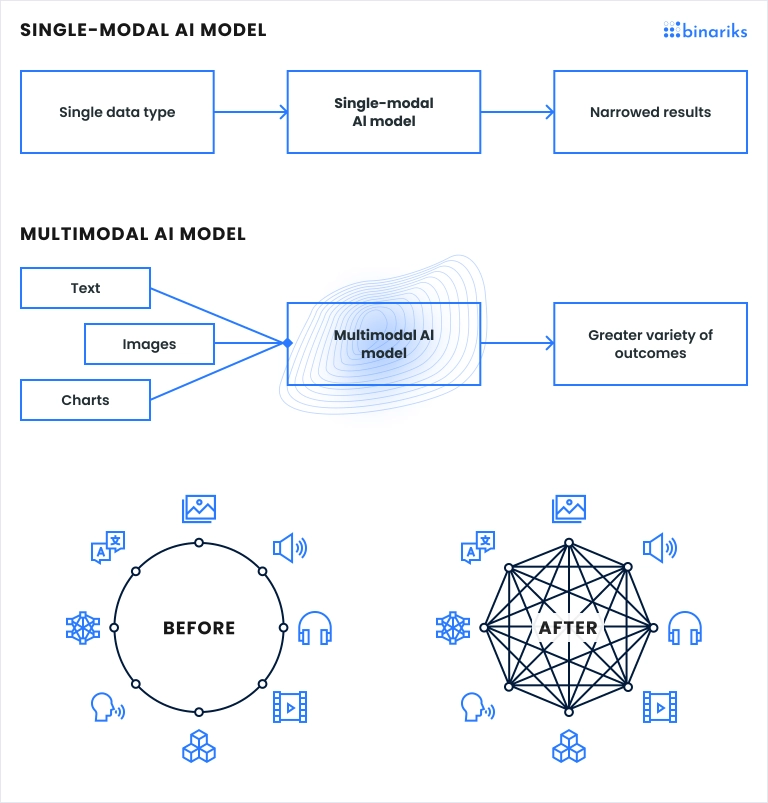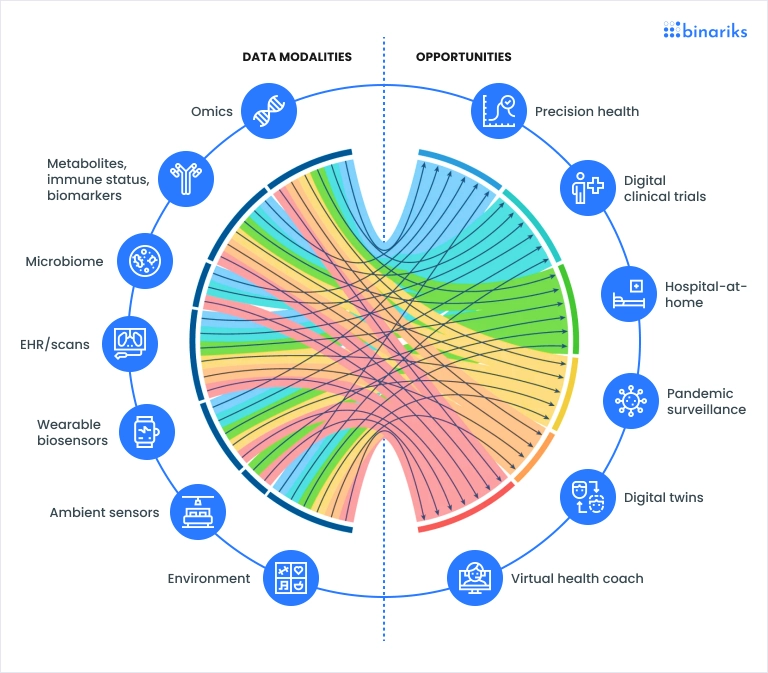What is multimodal AI in healthcare? Is it a separate artificial intelligence technology or just another fancy term that doesn't bring anything new?
Well, imagine a patient reaching out to their healthcare provider via a text message. The patient's symptoms are analyzed through Natural Language Processing (NLP), while computer vision interprets recent medical images and speech recognition processes spoken notes from their doctor's examination.
This holistic integration of various types of data creates a comprehensive health profile. Machine learning algorithms then work their magic, correlating information to generate a personalized diagnosis and treatment plan. Moreover, as the patient undergoes treatment, the system continuously learns, ensuring a dynamic and adaptive approach to healthcare delivery. These findings are constantly shared with the healthcare provider, fostering informed decision-making.
And it is multimodal AI that takes center stage in this transformative healthcare journey…
Understanding multimodal AI
More formally, multimodal artificial intelligence is an advanced AI approach or methodology that emphasizes the combined use of diverse AI technologies to simultaneously handle and interpret different types of data (multiple modalities). In short, it allows to streamline healthcare processes in a way that cannot be achieved with a single modality.

Though being a relatively new concept in AI, multimodal medical AI is especially relevant now. With the development of science and technology, healthcare professionals navigate through more and more data sources for both treatment decisions and administrative tasks. The reliance on these data, including imaging, time series, clinical data, etc., poses a challenge for individual professionals to master every specialized healthtech area and tool in addition to their initial medical specialization.
However, that is just one example of dozens.
In fact, multimodal AI outperforms single-modal AI in many aspects of health, medtech, and pharmaceutical applications by harnessing diverse data sources for a more comprehensive understanding of patient health. Combining information from various modalities such as medical images, clinical data, patient records, sensor data, etc., multimodal AI facilitates nuanced diagnostics and personalized treatment plans.
For instance:
- In medtech, it streamlines processes by integrating insights from different technologies, enhancing device interoperability and patient monitoring.
- The capability of multimodal generative models to generate new molecular structures and forecast interactions among diverse compounds proves advantageous in pharmaceutical research. This accelerates the drug discovery process and enhances the optimization of candidate selection.
- The holistic approach of multimodal AI improves decision-making for healthcare professionals, offering a harmonized view of patient data.
This versatility makes multimodal AI indispensable in the evolving healthcare landscape , where a singular approach falls short of capturing the complexity inherent in medical diagnoses and treatment strategies.
Opportunities of multimodal AI in healthcare
The convergence of diverse data modalities not only improves our comprehension of complex medical situations but also lays the groundwork for more refined and personalized medical treatments. Thus, multimodal AI healthcare holds immense potential to transform many aspects of the industry. Let's take a look at some of them.

Clinical trials
In clinical trials, digitization offers a groundbreaking solution to longstanding challenges. By incorporating diverse AI technologies, including wearable devices and smartphone-enabled self-reported questionnaires, researchers can overcome barriers related to time, cost, and participant diversity (across ethnicity, ancestry, healthcare access, geographic locations, and more).
The integration of data from multiple modalities not only enhances the granularity of information but also facilitates automatic phenotyping and subgrouping. This multimodal approach allows for adaptive trial designs, improving efficiency and responsiveness.
Moreover, AI models utilizing data from various modalities contribute to patient recruitment and retention. Synthetic control methods, supported by AI, help identify optimal synthetic controls, addressing a critical aspect of trial methodology. This integration of diverse data sources and AI techniques has the potential to revolutionize digital clinical trial design and execution.
Remote monitoring and care
Multimodal AI also augments remote monitoring and care. The combination of data from wearables , electronic health records (EHRs) , and ambient wireless sensors enhances the personalization of remote monitoring . For instance, when combined with wearables, ambient sensors improve fall detection systems and gait analysis performance, ensuring reliability while minimizing false alarms.
In the near future, this multimodal approach can extend beyond chronic conditions, demonstrating potential applications in acute disease scenarios as well, as exemplified by the Mayo Clinic's remote monitoring program during the COVID-19 pandemic (Source ).
Virtual health assistants
While over 35% of US consumers have smart speakers and 62% use voice-assisted devices, virtual health AI-powered coaches remain limited in scope, often targeting specific conditions or use cases.
Yet, looking ahead, the healthcare virtual assistants market is on a trajectory of substantial growth. It exceeded $708 million in 2023 and is poised to reach a significant milestone with an anticipated CAGR of 35% until 2036.
The advancement of virtual health assistants is set to benefit from the successful integration of multiple data sources, evolving them into broadly focused, personalized virtual health assistants. These advanced assistants can harness individualized profiles based on genome sequencing and continuous monitoring of blood biomarkers, biosensors, and other relevant biomedical data.
Personalized medicine
Multimodal biomedical AI plays a pivotal role in advancing personalized medicine by leveraging data from diverse sources. Wearable technology, combined with genetic and clinical data, allows for a holistic understanding of an individual's health.
In particular, advancements in sequencing technologies facilitate the acquisition of intricate biological data spanning multiple 'omes,' such as the genome, proteome, transcriptome, immunome, epigenome, metabolome, and microbiome. Integrating these diverse datasets goes beyond conventional boundaries, providing a comprehensive understanding of human health.
This comprehensive approach enables the prediction of disease risks and facilitates interventions tailored to a person's unique health profile.
In conclusion, transforming healthcare with multimodal AI holds great promise, addressing deep-rooted problems and opening avenues for more personalized and efficient medical interventions across diverse sectors.
Challenges of multimodal AI in healthcare
While the promise of multimodal models is substantial, their deployment into production systems is not without its challenges. These models tend to be computationally heavy, demanding both significant memory and computational resources. This makes them expensive to run, particularly at scale.
- Availability of data: Multimodal AI in healthcare grapples with limited data availability. Training effective models demands diverse datasets, posing challenges in accessing large, varied datasets, especially for specific medical conditions or rare cases.
- Data integration and quality: Challenges arise in healthcare data integration due to its heterogeneity. Maintaining quality, consistency, and compatibility in multimodal data streams (e.g., electronic health records, wearables, imaging) is crucial. Inconsistencies in data formats and standards impede seamless integration.
- Data privacy and security: Multimodal AI in healthcare prompts concerns about data privacy and security. Merging sensitive patient data demands robust privacy measures, compliance with healthcare regulations , and ensuring secure data transmission, storage, and processing for trust in AI solutions.
- Model complexity and interpretability: Multimodal AI model complexity challenges interpretability, hindering healthcare professionals' trust. Balancing sophisticated models for intricate relationships with the need for interpretable results remains an ongoing challenge. Achieving this balance is vital for AI acceptance in clinical practice.
Take your software to new heights with AI/ML solutions
Strategies to create multimodal AI solutions
1. Interdisciplinary collaboration
Foster collaboration between data scientists, healthcare professionals, and domain experts. Their collective expertise ensures a holistic understanding of healthcare challenges and facilitates the development of effective multimodal solutions.
2. Ethical considerations and regulatory compliance
Prioritize ethical considerations and adhere to regulatory standards in data handling, ensuring patient privacy and compliance with healthcare regulations. Implement robust security measures to safeguard sensitive healthcare information.
3. Continuous model validation and improvement
Establish a feedback loop for continuous model validation and improvement. Regularly assess and refine multimodal AI models based on real-world outcomes and user feedback to enhance performance and adapt to evolving healthcare needs.
4. User-friendly interface and interpretability
Design user-friendly interfaces that prioritize interpretability. Healthcare professionals should easily comprehend and trust the AI-driven insights, fostering seamless integration into clinical workflows.
5. Scalability and future-proofing
Develop solutions with scalability in mind, allowing for integration into diverse healthcare settings. Future-proofing involves anticipating technological advancements and evolving healthcare requirements to ensure the longevity of multimodal AI solutions.
How Binariks can help
Leverage Binariks' expertise to unlock the potential of multimodal AI for healthcare.
Our comprehensive AI/ML development and consulting services encompass every stage, from business analysis and project planning to user training and support. With a focus on security and interoperability, we adhere to international standards, ensuring compliance with regulations like HIPAA , HL7 , and GDPR. Our DevSecOps approach has the flexibility to fit various healthcare businesses' needs, ensuring the viability and effectiveness of delivered AI solutions.
How to become FHIR-compliant
FHIR implementation guide

Conclusion
In the realm of modern healthcare, multimodal AI emerges as a transformative force, seamlessly integrating diverse technologies to enhance patient care and streamline medical processes. From personalized diagnoses to revolutionary drug discovery, this advanced approach transcends conventional boundaries.
Binariks stands ready to facilitate this paradigm shift, providing comprehensive AI/ML services with a focus on security and compliance. As healthcare evolves, multimodal AI promises a future where innovation meets personalized, efficient, and informed medical interventions.
Share

